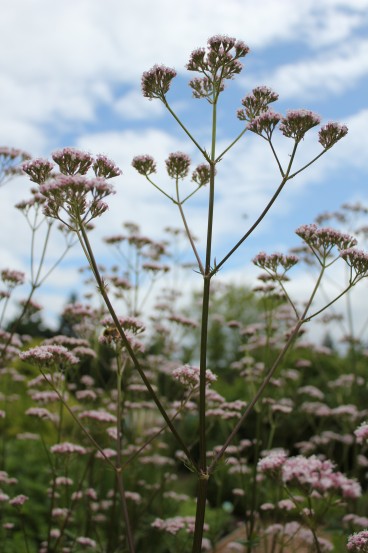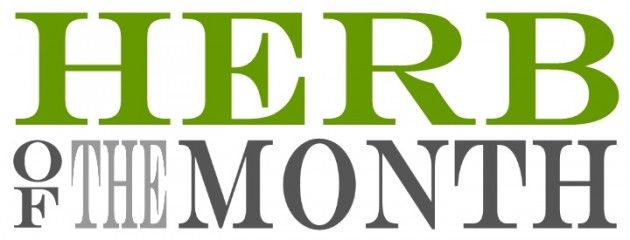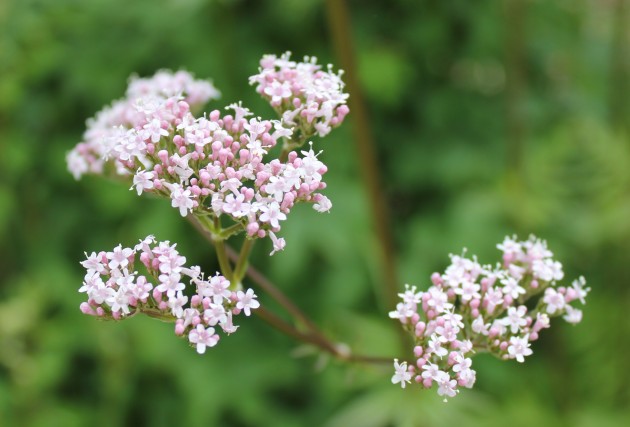Valerian (Valeriana officinalis)
useful for anxiety, insomnia, pain, intestinal spasms, and kidney stones


This is one herb I do not need, since I can fall asleep anywhere, anytime. But maybe you need it, and that is why I am sharing it with you.
Valeriana officinalis is this plant’s official Latin name, so you can (obviously) see why its common name is valerian. Sometimes it’s important to pay attention to the Latin names of plants, since some plant species may be more medicinal than others. Other times, different species can be interchangeable with relatively similar herbal properties. You should check herbal product labels for the exact medicinal species used in the product when you’re about to purchase an herb to use therapeutically. It really does pay to know a little bit about the herb before you go out and buy a random herbal product. The roots of valerian contain all of the medicinal properties discussed below, so if someone is selling you valerian, and the ingredients says “stems and flowers”, don’t buy it!
In herbal medicine, valerian is known as a nervine. Nervines are a group of herbs that have a pacifying effect on the nervous system. Valerian happens to be one of our stronger nervines, which is why it’s used to treat anxiety, panic attacks, and insomnia. Valerian is particularly useful for insomnia caused by stress and nervous tension.
If you’re looking for something to help you calm down and fall asleep, this may be the herb for you. Valerian has been found to decrease the amount of time it takes to fall asleep as well as to increase the quality of sleep. The upside of using an herb like valerian for better sleep is that it doesn’t make you drowsy during the day, unlike benzodiazepines.
There’s nothing shameful in needing a little herbal prodding to turn your brain off at night to catch some really important zzz’s. Better sleep means a stronger immune system, better detoxification, and graceful aging (yes, beauty sleep is a real thing).
Some people can get opposite effects from valerian, staying awake instead of going to sleep. If this occurs, valerian may be too strong for you. Talk to your licensed naturopathic doctor about switching to a milder nervine.
As an herbal pain reliever, valerian can be used for a variety of painful conditions, but it is best used on a short-term basis (valerian can still be used on a long term basis). Because it is also a nervine, it is useful in nerve related pain. In the women’s health department, it has been used to treat painful periods and endometriosis. It is also found in analgesic formulas for painful bladder syndrome or interstitial cystitis. Valerian can also be used as a wilderness first aid treatment to relieve pain from an injury on the trail. Just dig up the plant and chew on the fresh root. Although valerian has the ability to relieve pain, it’s not a narcotic, so don’t expect it to work on pain that would be rated a 10 out of 10.
Due to its spasmolytic properties, valerian can help to alleviate gastrointestinal colic as well as colic from the passage of kidney stones through the ureters (the tubes connecting the kidneys to the bladder). Something that is spasmolytic eases spasms. What an incredible combination for an herb; it’s both a spasmolytic and a pain reliever.
If you’re going to purchase and use valerian, make sure you have a high quality product. There’s no point in taking valerian if it’s not offering you the best of its roots.
Is your valerian product quality herbal medicine?

- The optimal therapeutic preparation of valerian is a fresh root tincture.
- Dried root preparations are not as potent. This means that the capsules will be less potent, too.
- Valerian should have a stinky socks odor with a hint of vanilla. If the valerian product you are using does not have this type of smell, question the quality of it.
- If you use the capsules, open them up and smell one. If you still can’t smell anything, moisten it a little bit to see if it emits the stinky socks odor.
If you would like to start taking valerian, please consult your naturopathic doctor. A licensed healthcare practitioner can tailor the dose according to your needs.
Resources:
1 Yarnell, Eric. Botanical Medicine V. Bastyr University. Spring 2011.
Enjoy More Archerfriendliness
Dear Adolescent Boys, Whenever I tell you that a genital exam is part of your annual well child check, your eyeballs fall out of your head in complete horror. The expression on your face makes ...
We read about Lachie MacLachlan and his bairns of 10 last week when the girls had the sniffles, so I had to put that bairns word in the title (forgive me). Selah didn't like the bairns book until...
It all started when Re'uth had the sniffles. The sniffles led to an ear infection, which resulted in a ruptured ear drum. Two weeks later, a second ear infection arose in the same ear. Unlike t...








Beth
April 23rd, 2012 at 11:45 am
Hello Archer,
I have been an advocate of valerian since my late teens. Of course, you would have that one in your ‘toolbox’ too! I’ve made tincture and also capped it. Your website is beautiful , thank you. have enjoyed it this morning on my laptop!! Way more fun than on the iphone. :) Stay well!!
Reply